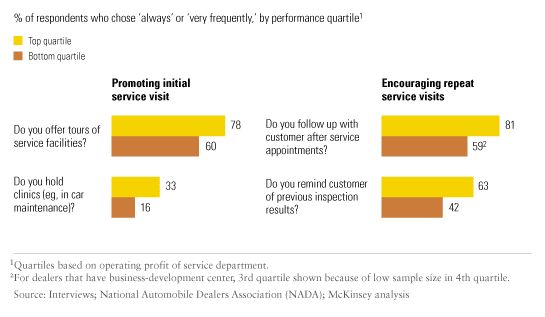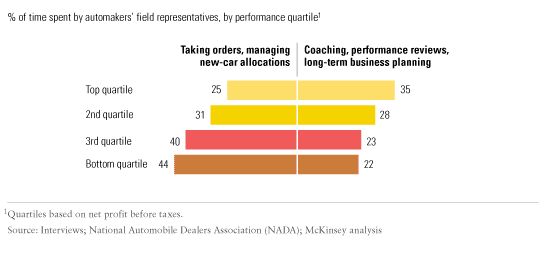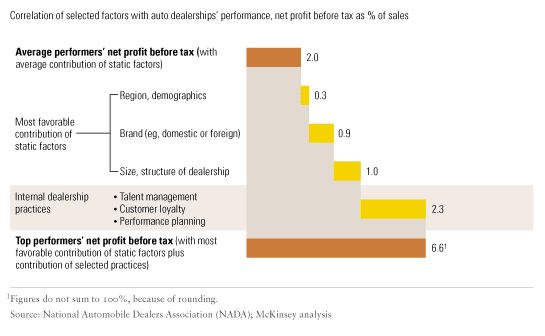The difference between an average dealership and a top performing dealership
Three key areas can be attributed to the gap between top performing and poor performing dealerships
In Ireland, distributors use different measures to define the success of its dealerships. With the majority of new cars now bought on PCP (Personal Contract Plan) and product and service plans evolving all the time, all in all, the base criteria by which distributors measure dealership success is similar. Despite these similarities, performance can vary greatly.
A NADA study of US dealerships highlighted a significant gap between top performing dealerships and average dealerships and attributed three areas in which top dealerships set themselves apart.
A NADA study of US dealerships highlighted a significant gap between top performing dealerships and average dealerships and attributed three areas in which top dealerships set themselves apart.
Top performing dealerships had turnover rates 17 percentage points lower than those of dealers in the lowest performing quartile.
1. Talent Acquisition
Given that Sales Executives account for the majority of roles within the typical dealership model, unsurprisingly, high turnover is commonplace.
The annual turnover rate for all dealership positions in the US is 39 per cent with Sales Executives experiencing a turnover rate of 72 per cent and a retention rate of just 33 per cent. These are stark numbers, yet, top performing dealerships had turnover rates at 17 percentage points lower than those of dealers in the lowest performing quartile.
In addition, the recruitment practices between the two differed greatly. Top dealerships use formal recruitment practices that include structured interview processes. They provide employees with professional training and use long-term incentives to retain their top talent.
In contrast, managers at poorly and average performing dealerships paid less attention to recruitment and were often not even part of the recruitment process.
Given that Sales Executives account for the majority of roles within the typical dealership model, unsurprisingly, high turnover is commonplace.
The annual turnover rate for all dealership positions in the US is 39 per cent with Sales Executives experiencing a turnover rate of 72 per cent and a retention rate of just 33 per cent. These are stark numbers, yet, top performing dealerships had turnover rates at 17 percentage points lower than those of dealers in the lowest performing quartile.
In addition, the recruitment practices between the two differed greatly. Top dealerships use formal recruitment practices that include structured interview processes. They provide employees with professional training and use long-term incentives to retain their top talent.
In contrast, managers at poorly and average performing dealerships paid less attention to recruitment and were often not even part of the recruitment process.
"People would normally assume that it's the size of the dealer, the location of the dealer or the brand the dealer is working with which determines the majority of the performance that you see across the industry." (It is down to) "the way a dealer runs the business within their own four walls. And that is highly determined by people practices." - Robert Mathis, McKinsey
Source: Automotive World
Source: Automotive World
2. Service Department
The second way top performing dealerships differentiate themselves, according to this study, is through customer loyalty practices.
It found that 63 per cent of top dealerships encouraged repeat service visitors by sending them reminders as opposed to only 42 per cent of the poor performers.
In recessionary times, service departments kept many dealerships open and while PCP purchases represent strong repeat custom, yearly service intervals can represent greater cash flow and profit per consumer.
The second way top performing dealerships differentiate themselves, according to this study, is through customer loyalty practices.
It found that 63 per cent of top dealerships encouraged repeat service visitors by sending them reminders as opposed to only 42 per cent of the poor performers.
In recessionary times, service departments kept many dealerships open and while PCP purchases represent strong repeat custom, yearly service intervals can represent greater cash flow and profit per consumer.

'The more profitable dealerships focus on practices in the service department that promote customer visits'
3. Distributor-dealership relationship
The study also found a direct correlation between the time spent reviewing the business performance of dealerships and dealership profitability.
Distributors who spent more time with dealerships coaching, conducting performance reviews and assisting with long-term business planning saw their dealerships experience higher performance and profitability. In comparison, distributors who focused most of their time on managing new car allocation and vehicle orders had poor performing dealerships. Poor performing dealerships indicated that distributor Dealer Network Managers spent only a fifth of their time reviewing the dealers' performance and offering suggestions for improvement.
The study also found a direct correlation between the time spent reviewing the business performance of dealerships and dealership profitability.
Distributors who spent more time with dealerships coaching, conducting performance reviews and assisting with long-term business planning saw their dealerships experience higher performance and profitability. In comparison, distributors who focused most of their time on managing new car allocation and vehicle orders had poor performing dealerships. Poor performing dealerships indicated that distributor Dealer Network Managers spent only a fifth of their time reviewing the dealers' performance and offering suggestions for improvement.

Today, the dealer network manager is expected to be one step ahead, analysing competitor threats and opportunities.
It's no secret that the distributor/dealer relationship can often be tempestuous however, what is clear, is that the role of the Dealer Network/Area Sales Manager is crucial to the success of that relationship.
In this study, nearly two-thirds of dealerships complained that their distributor representatives lacked the required knowledge to improve their operations.
With the changing landscape of the Irish Motor Industry and a lifting of embargoes on distributor recruitment, we are seeing a greater demand for subject matter experts when it comes to the important dealer network manager. No longer is it someone who 'gets on well' with the dealer and fulfils orders, but this individual is expected to be one step ahead-analysing competitor threats and opportunities, working parallel with the dealer to develop a robust business plan across all departments, conducting ongoing market intelligence and using that data to implement specific processes and products to enhance the dealers's profitability.
In this study, nearly two-thirds of dealerships complained that their distributor representatives lacked the required knowledge to improve their operations.
With the changing landscape of the Irish Motor Industry and a lifting of embargoes on distributor recruitment, we are seeing a greater demand for subject matter experts when it comes to the important dealer network manager. No longer is it someone who 'gets on well' with the dealer and fulfils orders, but this individual is expected to be one step ahead-analysing competitor threats and opportunities, working parallel with the dealer to develop a robust business plan across all departments, conducting ongoing market intelligence and using that data to implement specific processes and products to enhance the dealers's profitability.
It is often said but it can be hard to deliver upon but the fundamental basic principle here is that having the right people in the right positions will have a huge impact on your organisation's bottom line. More importantly however, these employees will act as ambassadors on behalf of your business, ensuring that you continue to attract top talent for the years ahead.
Share this article


